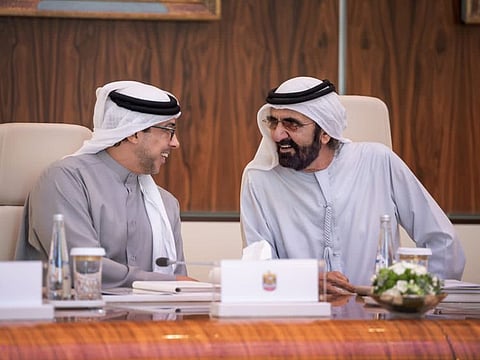UAE approves savings scheme, investment funds for private sector
Vice President Sheikh Mohammed bin Rashid approves plan as part of 11 new federal laws

Abu Dhabi: The UAE Cabinet today approved the introduction of an alternative system for end-of-service gratuity for private sector workers and free zones within the country. Employers can choose whether to participate in this system, which facilitates the creation of savings and investment funds managed by the private sector.
The decision was among 11 new federal laws announced during the Cabinet chaired by His Highness Sheikh Mohammed bin Rashid Al Maktoum, Vice President and Prime Minister of the UAE and Ruler of Dubai.
Regarding the new scheme for the private sector, the funds will be overseen by the Securities and Commodities Authority, working in collaboration with the Ministry of Human Resources and Emiratisation. This initiative intends to safeguard and grow the end-of-service gratuities that employees accumulate, by channelling them into various investment avenues.
The ultimate goal is to protect the workers’ savings, which symbolise their contributions to the companies they have served, and to guarantee that these savings are invested judiciously to uphold their rights and foster the well-being of their families.
Furthermore, this system extends the opportunity for employees in the government sector to engage in it for the purpose of savings and investment, thus creating a unified platform that supports the financial stability of workers across different sectors.
The Cabinet meeting was held at Qasr Al Watan in Abu Dhabi, where a total of 11 federal laws were sanctioned as part of an extensive legislative overhaul aimed at fostering social stability, economic growth, and an enhanced quality of life for the citizens. These legislative developments cover multiple sectors, including technology, media, healthcare, and space, echoing the nation’s commitment towards a holistic and sustainable growth trajectory.
Furthermore, the Cabinet gave the green light for a new system of rewards and incentives within the federal government. This system will feature monetary and non-monetary rewards, distributed across three distinct categories: exemplary annual performance at an individual level, exceptional accomplishments recognised regionally, and significant national contributions made by an employee in service of the country.
Return of astronaut Sultan Al Neyadi
The cabinet meeting coincides with Monday’s successful return to Earth of Emirati astronaut Sultan Al Neyadi after the longest Arab space mission, aboard the International Space Station, spanning six months. On the occasion, Sheikh Mohammed posted on his account on X (formerly Twitter): “Today [Monday] at Qasr Al Watan in Abu Dhabi, I chaired a Cabinet meeting. We reaffirmed the UAE’s steadfast commitment to advancing our ambitious space technology strategy, and to continue nurturing and dispatching more astronauts to the International Space Station.”
He added: “We are thrilled to welcome back Sultan Al Neyadi, the first Arab astronaut, from a significant mission at the International Space Station [ISS] where he contributed to numerous scientific experiments. This mission was organised with the support the Mohammed bin Rashid Space Centre, which oversees a comprehensive program for Emirati astronauts and the forthcoming space expeditions.”
“Sultan Al Neyadi stands as an inspirational figure for countless young individuals in the UAE and the Arab region, encouraging them to aspire for global leadership roles. We are confident that our future endeavors in space science will only soar to greater heights, blossoming into something even more remarkable,” Sheikh Mohammed said.
Host of initiatives
The approved federal laws include an E-commerce law to streamline and modernise trade practices through technological advancements, heralding a new era of digital commerce in the UAE.
Additionally, laws regulating the media sector, assisted reproduction, and the space sector were given the nod, reflecting a comprehensive approach to governance that intertwines societal well-being with technological progression. Noteworthy too is the Human Genome Use Law, anticipated to spearhead innovations in the healthcare sector.
The cabinet also approved the setting up of the Office of the Federal Regulator for the Water and Electricity Sector. This decision is aimed at overseeing the trade of electricity and water within the UAE and facilitating cross-border exchanges. Moreover, the office will be responsible for managing the production, transmission, and distribution of electricity and water throughout the nation. It will operate under the Ministry of Energy and Infrastructure, thus streamlining efforts in this sector.
Weight cap
The Cabinet also approved a federal law to regulate the use of heavy vehicles plying the nation’s roads. This significant legislation, set to be enforced from the beginning of next year, stipulates that heavy vehicles exceeding a maximum gross weight of 65 tonnes shall be banned from using the country’s roads.







